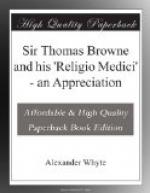We have seen in his own noble words how Sir Thomas Browne’s life appeared to himself. Let us now look at how he appeared to other observing men. The Rev. John Whitefoot, the close and lifelong friend of Sir Thomas, has left us this lifelike portrait of the author of Religio Medici. ’For a character of his person, his complexion and his hair were answerable to his name, his stature was moderate, and his habit of body neither fat nor lean, but [Greek text]. In his habit of clothing he had an aversion to all finery, and affected plainness. He ever wore a cloke, or boots, when few others did. He kept himself always very warm, and thought it most safe so to do. The horizon of his understanding was much larger than the hemisphere of the world: all that was visible in the heavens he comprehended so well, that few that are under them knew so much. And of the earth he had such a minute and exact geographical knowledge as if he had been by divine providence ordained surveyor-general of the whole terrestrial orb and its products, minerals, plants, and animals. His memory, though not so eminent as that of Seneca or Scaliger, was capacious and tenacious, insomuch that he remembered all that was remarkable in any book he ever read. He had no despotical power over his affections and passions, that was a privilege of original perfection, but as large a political power over them as any stoic or man of his time, whereof he gave so great experiment that he hath very rarely been known to have been overpowered with any of them. His aspect and conversation were grave and sober; there was never to be seen in him anything trite or vulgar. Parsimonious in nothing but his time, whereof he made as much improvement, with as little loss as any man in it, when he had any to spare from his drudging practice, he was scarce patient of any diversion from his study: so impatient of sloth and idleness, that he would say, he could not do nothing. He attended the public service very constantly, when he was not withheld by his practice. Never missed the sacrament in his parish, if he were in town. Read the best English sermons he could hear of with liberal applause: and delighted not in controversies. His patience was founded upon the Christian philosophy, and sound faith of God’s providence, and a meek and humble submission thereto. I visited him near his end, when he had not strength to hear or speak much: and the last words I heard from him were, besides some expressions of dearness, that he did freely submit to the will of God: being without fear. He had oft triumphed over the king of terrors in others, and given him many repulses in the defence of patients; but when his own time came, he submitted with a meek, rational, religious courage.’
Taking Sir Thomas Browne all in all, Tertullian, Sir Thomas’s favourite Father, has supplied us, as it seems to me, with his whole life and character in these so expressive and so comprehensive words of his, Anima naturaliter Christiana. In these three words, when well weighed and fully opened up, we have the whole author of the Religio Medici, the Christian Morals, and the Letter to a Friend. Anima naturaliter Christiana.




